
Ecosystem "services": air and water purification, climate regulation, nutrient cycling (look uphill to our watersheds-why are we not permitted to hike there?)
Also: tourism, resources (timber, mining, fisheries)
PSA-payment for environmental services
- watershed protection
- biodiversity
- scenic beauty (ecotourism)
- carbon sequestration
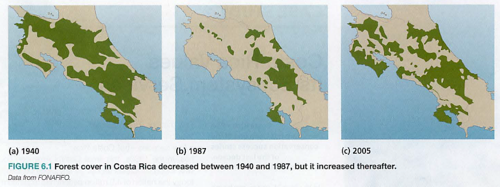
ecotourism: 2 million tourists=2 billion $ annually
Ethics-study of good and bad (e.g. values)
relativists: context based
universalists: objective based, no matter the context or culture
Kant: categorical imperative; do unto others as you'd have them do to you (golden rule)
JS Mill: principle of utility: greatest benefit for the most people
instrumental or utilitarian value-pragmatic value
intrinsic or inherent value-value for its own sake
McCauley: "appeal to people's hearts more than their wallets"
Industrialization brought about environmental ethics-why only then? how does this differ from the tribal societies that were here first? Did they believe on owning the land?
Think back to William McDonough: "all children, of all species, for all time"
Issues you will leave YOUR kids: conservation? pollution? species extinction?
conservation=sustainable development
pollution=environmental justice
extinction=intrinsic or instrumental values
Why is this evolving?
We are not just surviving, so we can now make choices
We know more science, so can see cause and effect more clearly
Three views:
Anthro (man) centrism=man-centered: only based around impact on PEOPLE
Bio (life) centrism=life centered: balanced between people and the environment
Ecocentrism=whole system awareness: awareness of the interconnectedness of things (big picture)

Western philosophy is based on "subduing and controlling nature", for our benefit.
Some religions also emphasize stewardship.
Ancient Hawaiians had a word for this: Kuleana
Kuleana: Ahupua'a model: ridge to ridge, peak to ocean (up to your chest)
Implies "your business" or "responsibility", but is much deeper. You are not the steward, you don't accept it, or deign it, it is something given to you because of where you live.
Vontaire: French phrase: "tend to your own garden" "Il faut cultiver son jardin", means either "mind your own business" or "take care of what is given to you"
Transcendentalism 1840: Thoreau, Emerson, Whitman: objected to materialism (e.g. Walden by Thoreau)
Natural entities as symbols or messengers of deeper truths
Preservation ethic-John Muir
John Muir like this stuff. Home in Yosemite (recall the film about Ansel Adams)
Preservation ethic springs from his work: nature for its own sake
"everybody needs beauty as well as bread" "places to play in, pray in, where nature may heal and give strength to body and soul alike"
Conservation ethic-Gifford Pinchot
Later (1910) Gifford Pinchot-first professional American Forester-founded the US Forest Service under Teddy Roosevelt
Conservation ethic springs from his work: greatest good to the greatest number for the greatest span of time (note the last bit)
Prudent use of resources for the good of present AND future generations. Why is this critical?
Environmental Ethic-Aldo Leopold
Aldo Leopold (1930) followed from Pinchot, studied healthy ecosystems. Holistic perspective, people and the land as members of the same community.
"a thing is right when it tends to preserve the integrity, stability, and beauty of the biotic community. It is wrong when it tends otherwise".
The Land Ethic-his work, also "Sand County Almanac", which along with "Silent Spring" by Rachel Carson are the two most influential environmental books of the 20th century
Environmental justice: pollution, exploitation, resource depletion, species degradation
e.g. Appalachians: mountaintop removal (mining) destroy forests, pollute water, bury streams, flooding, toxic waste
Economy=system that produces goods from resources (e.g. food from sunlight and water)
Economics-study of resource supply and demand
Economics and Ecology both come from the Greek "oikos" meaning household (seen this name somewhere else?)
inputs=natural resources, ecosystem services
outputs=waste

Adam Smith (1750): self interested economic behavior can benefit society as long as the behavior is constrained by the rule of law and private property rights within a competitive marketplace
Classical Economics is the result, and the market is the "invisible hand" guiding these actions
Neoclassical (new classical) economics: supply and demand, also cost benefit analysis (e.g. removing pollution)

See above: when quantity is high (right side of graph), demand is low, supply is high.
When supply is low, price is high.
Equilibrium means "equal freedom"
Compare this with state run economies, where supply is controlled by the central government (e.g. Stalinist USSR, or present day Venezuela, Zimbabwe or other countries).
Fallacy #1 in the Neoclassical economic model: there will always be more resources (think of oil, timber or minerals).
Fallacey #2: all costs and benefits are borne directly by those in the transaction (e.g. no externalized costs).
Externalized costs:
- health problems (e.g. pollution impact)
- resource degradation or depletion
- aesthetic (beauty) damage
- declining value (resources, tourism, higher health care costs)
When economists ignore the externalized costs, this creates a false impression of the consequences of choices, so change is harder to achieve. It also means the government (e.g all of us) often picks up the cost.
Fallacy #3: future events have less value than present events ("I want it now, someone can deal with the consequences later")
This is known as "discounting" the future
Fallacy #4: Economic growth is essential for social order: "Affluenza"
Sustainable growth:
1; increase in inputs or 2: increase in efficient use of resources (e.g. recycling, cradle to cradle)
"Cornucopians" say #1 is the answer (horn of plenty)
"Cassandras" say #1 will not work (all prophesies of hers were true, but cursed that nobody believed her)
Here's how this could go down:

Cassandra folks: Limits to Growth (Jorgen Randers, who spoke at the opening of the Elab in 2009) and his graduate student Mathis Wackernagel, who founded the Global Footprint Network
Mathis was the first to teach in the elab, on the west whiteboard in our classroom...
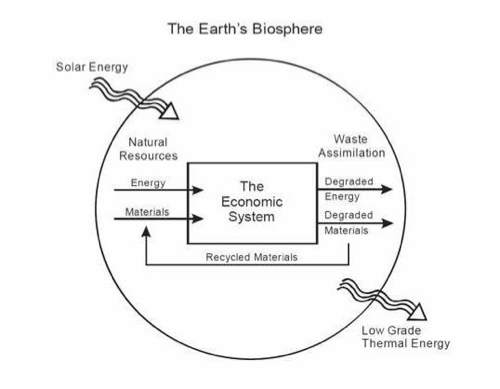
Note this is different from Malthus, who only wrote about food and population:
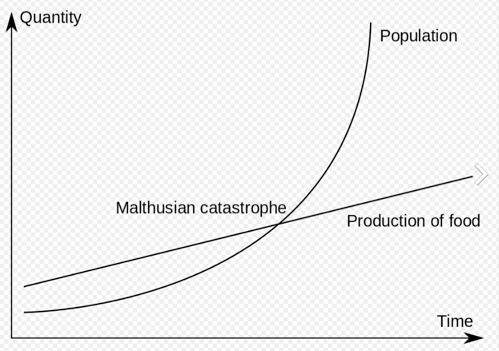
Climate change is another example of this: How much will climate change cost?
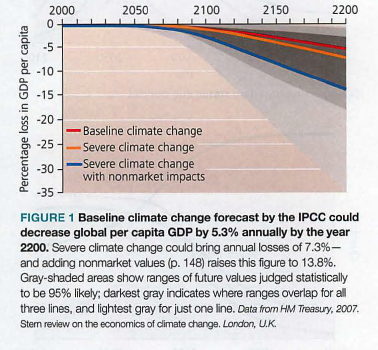
Environmental Economics: modified neoclassical economics to achieve sustainability, advocating a "steady-state economy":
Check this out:
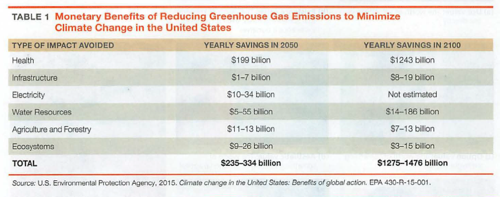
This leads to non-market valuation:
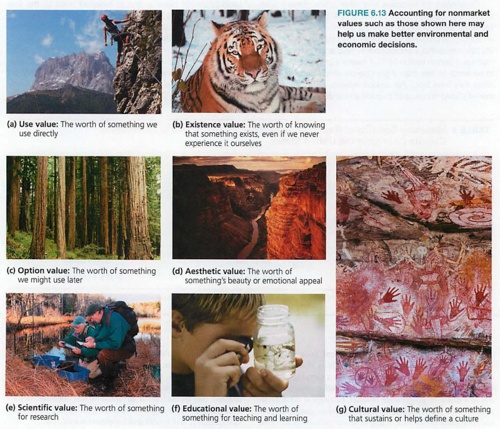
Which makes the most sense to you?
Ecosystem services value estimates:

Old way of measuring the output of a country: GDP: Gross Domestic Product (Used to be called GNP but corporations are often off-shore, like Apple)
Alternate method: Genuine Progress Indicator (GPI): positive impacts minus the negative impacts, also known as "full cost accounting" or "true cost accounting". Used in Maryland since 2010, now their GPI is greater than their GDP.
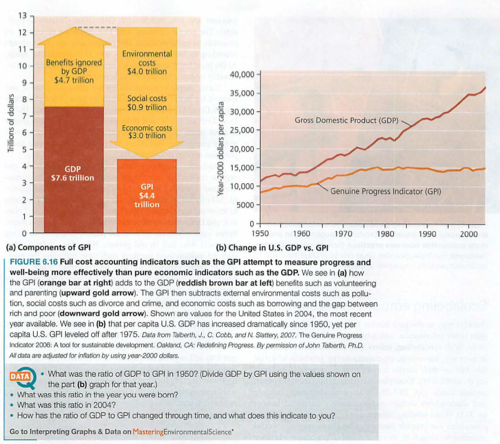 Ecolabeling empowers consumers (brings informed decision making to the marketplace)
Ecolabeling empowers consumers (brings informed decision making to the marketplace)See also socially responsible investing (Ben and Jerry's ice cream, Newman's own, etc.)
See also "fair trade" coffee at Starbucks and others
Dark side of this: "greenwashing"
Sustainable development involves a "triple bottom line" ("bottom line" refers to the bottom of a spreadsheet, used in accounting, often a profit/loss line):

UN sustainable goals, 2015:
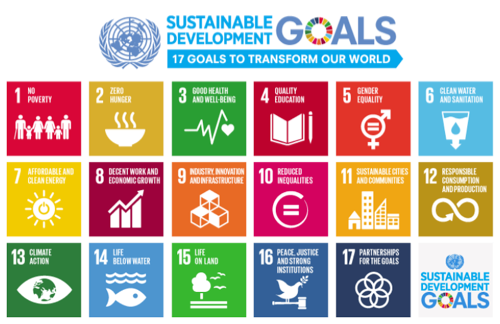
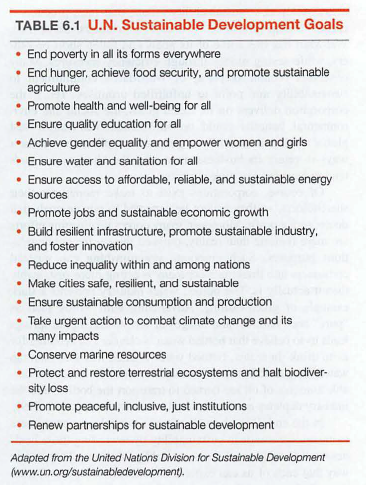
Which of these can you impact?
Homework: page 155 1-11, page 156 1-4
Next:
/groups/apenvironmentalscience/search/index.rss?tag=hotlist/groups/apenvironmentalscience/search/?tag=hotWhat’s HotHotListHot!?tag=hot6/groups/apenvironmentalscience/sidebar/HotListadminadmin2020-08-19 15:43:59+00:002020-08-19 15:43:59updated30adminadmin2011-09-08 21:36:21+00:002011-09-08 21:36:21updated29adminadmin2011-08-24 23:20:40+00:002011-08-24 23:20:40updated28adminadmin2011-08-24 22:42:36+00:002011-08-24 22:42:36updated27adminadmin2011-08-22 02:41:09+00:002011-08-22 02:41:09updated26adminadmin2011-08-22 02:40:02+00:002011-08-22 02:40:02updated25adminadmin2011-08-21 20:39:11+00:002011-08-21 20:39:11updated24adminadmin2011-08-21 20:30:42+00:002011-08-21 20:30:42updated23adminadmin2011-08-21 20:30:13+00:002011-08-21 20:30:13updated22adminadmin2011-08-21 20:25:48+00:002011-08-21 20:25:48updated21adminadmin2011-08-21 20:25:18+00:002011-08-21 20:25:18updated20adminadmin2011-08-21 00:22:12+00:002011-08-21 00:22:12updated19adminadmin2011-08-21 00:18:56+00:002011-08-21 00:18:56updated18adminadmin2011-08-21 00:15:43+00:002011-08-21 00:15:43updated17adminadmin2011-08-21 00:12:37+00:002011-08-21 00:12:37updated16adminadmin2011-08-21 00:12:02+00:002011-08-21 00:12:02updated15adminadmin2011-08-20 23:59:41+00:002011-08-20 23:59:41updated14Added tag - hotadminadmin2011-08-20 23:59:38+00:002011-08-20 23:59:38addTag13Added tag - conservationadminadmin2011-08-20 23:59:32+00:002011-08-20 23:59:32addTag12Added tag - critical thinkingadminadmin2011-08-20 23:59:19+00:002011-08-20 23:59:19addTag11Added tag - ch1adminadmin2011-08-20 23:59:08+00:002011-08-20 23:59:08addTag10Added tag - sustainabilityadminadmin2011-08-20 23:59:05+00:002011-08-20 23:59:05addTag9adminadmin2011-08-20 20:47:39+00:002011-08-20 20:47:39updated8adminadmin2011-08-20 20:46:15+00:002011-08-20 20:46:15updated7adminadmin2011-08-20 20:43:07+00:002011-08-20 20:43:07updated6adminadmin2011-08-20 19:14:13+00:002011-08-20 19:14:13updated5adminadmin2011-08-20 19:11:26+00:002011-08-20 19:11:26updated4adminadmin2011-08-20 18:59:57+00:002011-08-20 18:59:57updated3adminadmin2011-08-20 18:56:59+00:002011-08-20 18:56:59updated2First createdadminadmin2010-11-07 01:41:28+00:002010-11-07 01:41:28created1wiki2020-08-19T15:43:59+00:00groups/apenvironmentalscience/wiki/welcomeFalseCh01 Overview/groups/apenvironmentalscience/wiki/welcome/Ch01_Overview.htmladmin30 updatesCh01 Overview
Welcome to our APES wiki. You should be able to do the following after logging in with your account:
To create a new page, click the ...Falseadmin2020-08-19T15:43:59+00:00adminadmin2013-02-05 02:24:03+00:002013-02-05 02:24:03updated4Added tag - hotadminadmin2013-02-05 02:24:02+00:002013-02-05 02:24:02addTag3adminadmin2013-02-05 02:05:35+00:002013-02-05 02:05:35updated2First createdadminadmin2013-02-05 02:03:35+00:002013-02-05 02:03:35created1wiki2013-02-05T02:24:03+00:00groups/apenvironmentalscience/wiki/394a8FalseEnergy notes/groups/apenvironmentalscience/wiki/394a8/Energy_notes.htmladmin4 updatesEnergy notes
Week of 2.4.13: energy wrap-up
e2 video: coal vs. nuclear in class
AP exams: FRQ
2002.1
2004.2
2006.1
2007.2
2008.1
...Falseadmin2013-02-05T02:24:03+00:00adminadmin2013-02-05 02:23:20+00:002013-02-05 02:23:20updated6Added tag - hotadminadmin2013-02-05 02:23:18+00:002013-02-05 02:23:18addTag5adminadmin2013-02-05 02:23:12+00:002013-02-05 02:23:12updated4adminadmin2013-02-05 02:21:48+00:002013-02-05 02:21:48updated3adminadmin2013-02-05 02:20:26+00:002013-02-05 02:20:26updated2First createdadminadmin2013-02-05 02:06:00+00:002013-02-05 02:06:00created1wiki2013-02-05T02:23:20+00:00groups/apenvironmentalscience/wiki/c360bFalseFeb-May plan/groups/apenvironmentalscience/wiki/c360b/FebMay_plan.htmladmin6 updatesFeb-May plan
1. conclusion of energy chapters (see previous wiki)
2. GCC AP questions FRQ:
2006.2
2005.3
2005.4
2007.3
...Falseadmin2013-02-05T02:23:20+00:00adminadmin2012-03-07 05:53:55+00:002012-03-07 05:53:55updated14adminadmin2012-03-07 05:43:38+00:002012-03-07 05:43:38updated13adminadmin2012-03-07 05:41:35+00:002012-03-07 05:41:35updated12adminadmin2012-03-07 05:38:57+00:002012-03-07 05:38:57updated11Added tag - hotadminadmin2012-03-07 05:38:55+00:002012-03-07 05:38:55addTag10adminadmin2012-03-07 05:36:47+00:002012-03-07 05:36:47updated9adminadmin2012-03-07 05:22:26+00:002012-03-07 05:22:26updated8adminadmin2012-03-07 05:20:01+00:002012-03-07 05:20:01updated7adminadmin2012-03-07 05:18:58+00:002012-03-07 05:18:58updated6adminadmin2012-03-07 04:58:55+00:002012-03-07 04:58:55updated5adminadmin2012-03-07 04:57:33+00:002012-03-07 04:57:33updated4adminadmin2012-03-07 04:56:53+00:002012-03-07 04:56:53updated3adminadmin2012-03-07 04:54:20+00:002012-03-07 04:54:20updated2First createdadminadmin2012-03-07 04:53:33+00:002012-03-07 04:53:33created1weblog2012-03-07T05:53:55+00:00groups/apenvironmentalscience/weblog/de030FalseGreen Apple/groups/apenvironmentalscience/weblog/de030/Green_Apple.htmladmin14 updatesGreen Apple
Team,
Please watch this video about NYC:
Trailer:
http://www.pbs.org/e2/episodes/101_the_green_apple_trailer.html
On the server:
http://physics.hpa...Falseadmin2012-03-07T05:53:55+00:00adminadmin2011-09-13 19:08:24+00:002011-09-13 19:08:24updated4Added tag - hotadminadmin2011-09-13 19:08:22+00:002011-09-13 19:08:22addTag3adminadmin2011-09-13 19:08:10+00:002011-09-13 19:08:10updated2First createdadminadmin2011-09-13 19:04:30+00:002011-09-13 19:04:30created1weblog2011-09-13T19:08:24+00:00groups/apenvironmentalscience/weblog/4ecddFalseQuestions for Wednesday, wiki adds/groups/apenvironmentalscience/weblog/4ecdd/Questions_for_Wednesday_wiki_adds.htmladmin4 updatesQuestions for Wednesday, wiki adds
Team,
I'd like to try something for class tomorrow: each of you to create a question from chapter 3, and email it to me by this evening (Tuesday). Pl...Falseadmin2011-09-13T19:08:24+00:00hot/groups/apenvironmentalscience/search/index.rss?sort=modifiedDate&kind=all&sortDirection=reverse&excludePages=wiki/welcomelist/groups/apenvironmentalscience/search/?sort=modifiedDate&kind=all&sortDirection=reverse&excludePages=wiki/welcomeRecent ChangesRecentChangesListUpdates?sort=modifiedDate&kind=all&sortDirection=reverse&excludePages=wiki/welcome0/groups/apenvironmentalscience/sidebar/RecentChangesListmodifiedDateallRecent ChangesRecentChangesListUpdateswiki/welcomeNo recent changes.reverse5searchlist/groups/apenvironmentalscience/calendar/Upcoming EventsUpcomingEventsListEvents1Getting events…
Comments